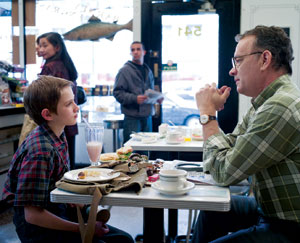

STEPHEN DALDRY‘S film Extremely Loud and Incredibly Close, like Jonathan Safran Foer’s source novel, concerns a child’s act of denial about Sept. 11. He ultimately reverses time’s arrow through his arts and crafts.
Like It’s a Wonderful Life, Extremely Loud and Incredibly Close is a greeting-card-size fantasy. But the adaptation has been beefed up with movie stars.
First: Sandra Bullock as the surviving mom in denial, not wanting to talk about it all. Second: Feel griefed-out by the terrorist attacks, and the tears won’t start? What if it were Tom Hanks in those skyscrapers, on what the film euphemistically calls “The Worst Day”?
And not just Tom Hanks, but Tom Hanks as a perfect storybook dad. A Tom Hanks who works in an old gold store that sells watches and trinkets, a Tom Hanks willing at all times to bond with his son, to join him in play.
Thomas Horn (seen on the film’s poster in a variation on Macauley Culkin’s Home Alone pose) plays Hanks’ 10-ish son, Oskar. “Oskar” is a significant name, considering the filmmakers’ hopes for an Academy Award. Oskar is a bright child who has something that’s supposed to be similar to Asperger’s syndrome, some condition that’s made him a talkative buzz-ball, full of quotes and word games.
When his father disappears in the smoke and the rubble, Oskar believes a message was left for him. Despite Oskar’s numerous phobias, he searches for the true possessor of a key his father wanted him to have. It was in an envelope with “black” written on it. Certainly, this key must open the secret of the “Schvartze tog,” the Black Day, as the Yiddish expression goes.
Young Oskar checks everyone in the phone book with the name Black. The very first, Abby Black, is indeed African American; she’s played by Viola Davis, brimming with tears. Oskar checks out several hundred other New Yorkers with that commonplace name—a montage of a city. All are but a school of red herrings.
Oskar’s assistant on this mission is an old neighbor billed as “The Renter” (Max von Sydow), living as a lodger with his grandmother. He’s a Holocaust survivor who has taken a vow of silence. Writing memos in a little Moleskine notebook, he agrees to accompany Oskar as he combs the city.
This gimmick is as full of 10 -pound poetry as it sounds; “The Renter” has “yes” and “no” tattooed on his palms. One starts to daydream about arming him with a Harpo-style klaxon.
The true identity of “The Renter” is one more mystery, one more indication that a child’s specialness has to be tiptoed around and indulged.
In fact, true drama and real sadness are found in the way adults have to break the bad news to a child: in those moments when a child feels the thorns of adult wisdom, as in The Fallen Idol or Great Expectations or Forbidden Games.
The story is about how Oskar ignores a real last message in favor of a fantastic charming one. And the film counsels us to follow his example. Sept. 11 was meant to reduce us to the state of children, fearing and questioning everything.
Extremely Loud and Incredibly Close patronizes us, presenting the story of the attacks as if via a children’s pop-up book. It insists there are no words to explain what happened.
The cold truth is that we do know why. As comedian Lewis Black put it, Bin Laden “fucking told us why.” Wouldn’t a child as ingenious as Oskar want to face those hard reasons for the savagery?
Extremely Loud and Incredibly Close longs for you to embrace it, but there’s no room to squeeze it. The film is embracing itself for its cleverness, for its cuteness and for the fineness of its images.
Praising a movie’s photography is calling it a failure by another name, but Chris Menges’ cityscapes are lambent, taking in everything from the bridges to the tunnels to the poignant swamps around JFK Airport.
But Extremely Loud and Incredibly Close takes the specific tragedy of Sept. 11 and makes it a children’s story. Ultimately, this film makes the world a little bit more like the old man in it: dumb.
Extremely Loud and Incredibly Close
PG-13; 129 min.



